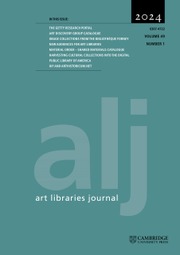No CrossRef data available.
Article contents
research-article
Published online by Cambridge University Press: 06 June 2016
Extract
Painting, true painting, is an act of revelation. Therefore it is contradictory to learning. The creative act cannot come forth without an unlearning. It is a process from within to without, contrary to reading. However, there cannot be an unlearning without previous learning. The accumulation of knowledge can be compared, if not to fuel, which it is also, at least to a guiding system: the practising artist cannot know how his work relates to historical time without this knowledge of all art and its dilemmas.
The peintre-savant such as emerged in the seventeenth century, incarnated by Poussin, Rubens, and most probably Velazquez, could not possibly have come into existence without the library - the list of Velazquez’ books in that respect is telling: it included all the books a seventeenth century humanist would have wished, but the bulk of it was about art theory. But strangely enough, art history was neglected by most leading modernist artists. Kandinsky preferred the occult “sciences” to the study of art-theory and would have been surprised to discover that Lomazzo formulated some of the ideas which he, Kandinsky, considered new and revolutionary. Mondrian would have been shocked to discover that Quatremère de Quincy and ultra-idealism preceded his own ideas. Klee would have been exhilarated with Arcimboldo’s clavicello cromatico by which he equated sound and colour.
Now, after the close of the modernist era, it seems as if we are left with a devastated land: the disconnection between eye and hand for the painter is followed by the one between feeling and judgement for the viewer. The decadence of art-training is followed by a growing confusion between cultural history and art history, which is the history of exceptions. But besides the devastation we have also inherited a graver sense of the limitations, which the peintres-savants of the past couldn’t have had: they still could believe in eternity. For us, eternity is lost.
- Type
- Research Article
- Information
- Copyright
- Copyright © The Art Libraries Society 1986




